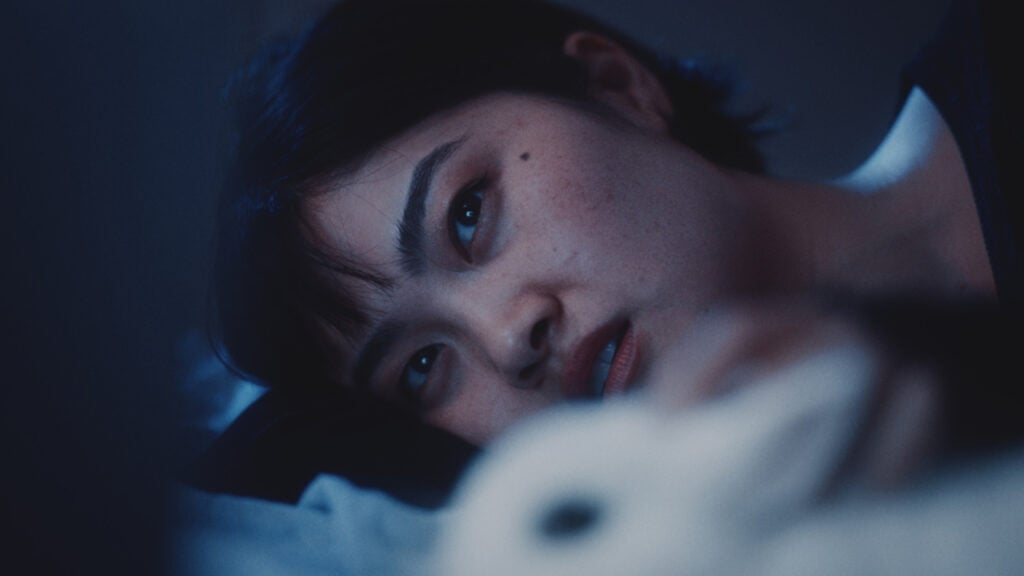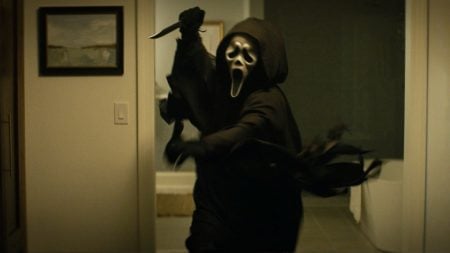One of the first things we see in Katarina Zhu’s feature debut Bunnylovr is the writer, director, and star lounging in front of her laptop and chatting to an audience of anonymous usernames. The prospect of being a “cam girl” is likely not that unusual to anyone born after the new millennium who has grown up with the internet as a ubiquitous presence. After all, it is not so different from the “world’s oldest profession,” and through this path, sex workers are given a bit more control and safety. While anecdotal evidence shows that modern youths are uncomfortable with sexuality in media, the consensus is that sex positivity within personal expression has been on a general upswing. This means that if you have a need and desire to expose yourself physically or emotionally to the world at large in exchange for goods and services, you should proudly get that bag.
This all can come at a cost, though. At least, if you have underlying ennui, it more than likely is not going to fix this in some magical way. As theoretically amazing as the internet can be when it comes to connecting people globally, it has the uncanny ability to make the world feel extremely small and isolating. Zhu plays Rebecca, a girl longing for connection between her twilight time in front of the camera and her thankless day job as a personal assistant. Zhu works with her director of photography Daisy Zhou to make even the world outside of her laptop screen feel suffocating.
You feel this most in the real world when Rebecca is attempting to build back a relationship with her father, William (Perry Yung). The film does not overly excavate the rift between father and daughter, but you get plenty of clues with his constant gambling and apparent carelessness with those around him. Yet Rebecca persists in the hopes of connection, constructing an unstable foundation upon the reality that William is terminally ill. Rebecca is most supported by her relationship with her privileged artist best friend Bella (Rachel Sennott) who she models for in her spare time. Bella has strong opinions and is not afraid to speak her truth, but this dynamic alone cannot fix Rebecca’s feeling of being adrift in her own life.
Where she is most in control is in front of the camera manufacturing tenuous connections with her viewers and engaging in some private sessions when someone is willing to fork over the money. Things begin to change when the enigmatic John begins to monopolize her time with constant private sessions. This shrouded businessman eventually reveals himself, played with a dangerous intensity by Hit Man breakout Austin Amelio. The illusion of safety behind the screen is somewhat broken when John sends Rebecca a rabbit to be a companion. Rebecca is self-aware enough to politely protest upon receiving the unexpected gift, but the lack of a determined rejection leads to her keeping and caring for her new friend, adorably named Milk.
Whereas a movie such as Babygirl puts an interesting twist on the interplay between sexuality and power dynamics, Bunnylovr is more traditional with John pushing Rebecca more out of her comfort zone with each session and request. John is older and bankrolling Rebecca’s life to the point where he wants to claim her as his property–you know, very normal stuff. Zhu does provide some moments when you can somewhat see what Rebecca is getting out of the interactions with John outside of the money, but his vibes are so sinister that the movie never does enough to convince you why she is making certain decisions. A request to transition these digital interactions to real life is especially baffling considering the events leading up to this point, leaving you feeling like things are happening for the convenience of the plot rather than by natural progression.
Katarina Zhu does a really incredible job of creating an immersive atmosphere with a distinct vision behind the camera, and she is likewise a captivating presence on screen. This is what makes the lack of follow-through in the script such a frustrating experience. Larger ideas around isolation, consent, and sex work in the 21st century are broached in a variety of ways, but few materialize into something profound. There are characters introduced such as a casual romantic partner for Rebecca early in the film who seemingly disappear without much fanfare. At under 90 minutes, the feature moves at a good pace, but we would have been fine with another ten or fifteen minutes or so to dive a little deeper thematically. The movie is admittedly engaging, but it does not feel like the best version of itself.
For better or for worse, Bunnylovr feels like a film made by and for Gen Z. The film conjures some intoxicating vibes at times while depicting a generational listlessness that is all too relatable. There is just not much that digs beneath the surface of any given issue, leaving you feeling generally satisfied yet not artistically nourished. Katarina Zhu shows a lot of great promise with this first outing, and we are anxious to see her get a chance to grow in the future.
Bunnylovr had its World Premiere in the U.S. Dramatic Competition section of the 2025 Sundance Film Festival.
Director: Katarina Zhu
Writer: Katarina Zhu
Rated: NR
Runtime: 86m
Writer/director Katarina Zhu crafts an engaging vision of 21st century loneliness that captures the feeling of isolation without getting to a deeper meaning to make the work as thematically rich as intended.
-
GVN Rating 6
-
User Ratings (0 Votes)
0

Dillon is most comfortable sitting around in a theatre all day watching both big budget and independent movies.






